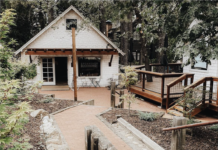The Advisory Committee for County Service Area 38 (Pine Cove) unanimously recommended that Riverside County continue to collect the parcel fee, without any change, through fiscal 2015-16.
During 2016, either at the June primary or November General Election, the committee will ask CSA 38 residents whether to continue the fee or eliminate it.
In 2004, more than three-quarters of the CSA voters approved the parcel fee. Its initial level was $50 and increased 2 percent annually, to the current level of about $59. The purpose of the assessment was to provide additional funding for ambulance service to Pine Cove and support for the volunteer firefighters at Station 23.
Since the mid-1990s, Riverside County has contracted with Idyllwild Fire Department to provide emergency ambulance service to the CSA 38 residents. The cost of this contract, currently $128,000, came from the CSA 38 revenue.
The parcel fee raises about $96,000 annually, which is considerably less than the ambulance contract cost. The additional funds come from the CSA’s property-tax revenues.
CSA 38 was established before California voters approved Proposition 13 in 1978. Consequently, CSA 38 receives a portion of the county property taxes paid by Pine Cove residents. These revenues are about $60,000 annually.
Beginning July 1, the county has contracted with American Medical Response to provide the ambulance service to Pine Cove. CSA 38, similar to the past policy applied to the rest of the county’s unincorporated areas, will no longer be responsible for paying the ambulance cost. Individuals who receive emergency service are responsible for those costs, including transportation to a medical facility.
Since the major reason for establishing the parcel fee has been shifted to the county, the Advisory Committee has begun discussing whether the fee is still needed and, if so, at what rate. Use of the parcel fee revenue is restricted to its original intent.
“I’m comfortable continuing the fee, but not indefinitely,” Bill Brown, CSA operational manager for the county’s Economic Development Agency, told the committee, “but we need to clarify to the community the need for a broader language. How many things can you do [with the funds]? How much needs to be collected?”
He felt the Board of Supervisors would prefer that CSA residents express a current opinion on the direction for the parcel fee.
The discussion initially revolved around the level of the fee. Since CSA 38 reserves are about $530,000, committee member Thom Wallace questioned whether the full amount was needed immediately.
However, for several years, the Advisory Committee has recommended the county purchase for Station 23 a new 4-wheel drive engine, whose cost will exceed $400,000. This recommendation is included in the proposed 2015-16 budget, which the committee had approved earlier in the meeting.
While the county continues to support this proposal, Mountain Division Chief Sean Dakin, of Riverside County Fire Department, explained that discussions and a search for other funding sources have been ongoing, which is one reason the purchase hasn’t happened yet.
Brown also recommended that the engine purchase remain in the CSA budget, “… so you have flexibility, but don’t expect action for awhile.”
Committee Chair Jerry Holldber thought the parcel fee might be used to enhance future AMR service. He favored a reduction this year, “… we need to be flexible in the future and can always go back up if merited.”
“Categorically, I can imagine AMR wanting to give you a level [of service] above other areas,” Brown assured the committee.
Since AMR is a private company rather than public, “… I think it is prudent to keep some level of fee for a year,” responded committee member Robert Hewitt.
Nancy Borchers, CSA 38 resident, agreed with Hewitt: “We do not know the quality of ambulance service and may need the fee. If we don’t have the funds, we may be letting the people of Pine Cove down. It is stupid to drop it now and have to beg the population to rescue us if we need it.”
When resident Norm Cassen asked how much of the current reserve was contributed from the parcel-fee revenues, Brown replied, “Nothing. For many years the cost of the contract was more than the parcel-fee revenue. The [property tax] revenues paid the difference for the contract. None of the reserves are from the parcel fee.”
Lou Padula then recommended maintaining the fee through fiscal 2015-16 and letting residents decide its future beyond then.
If the parcel fee’s future were decided during the June 2016 primary election, Brown opined that the “… higher turnout would be more representative of the voter base.”









